Let's look at the generated assembly using the Debug build of a 32-bit Visual Studio project (default settings):
Here's my program:
extern "C" int func1(int x);
extern "C" int __stdcall func2(int x);
extern "C" int __cdecl func3(int x);
int main()
{
int x = 0;
func1(1);
func2(2);
func3(2);
return 0;
}
Where func1, func2, and func3 are defined in a separate source file to limit the possibility of automatic inlining.
Let's look at the generated assembly code for main:
func1(1);
002117E8 push 1
002117EA call _func1 (0211159h)
002117EF add esp,4
func2(2);
002117F2 push 2
002117F4 call _func2@4 (0211131h)
func3(3);
002117F9 push 3
002117FB call _func3 (021107Dh)
00211800 add esp,4
For func1 and func3, it's the same signature. The argument is pushed onto the stack, the function call is invoked, and then the stack register (esp) is adjusted back (popped) to it's previous address - as expected for _cdecl calling convention. In __cdecl calling convention, the caller is responsible for restoring the stack pointer to its original address after a function call is made.
After the invocation of func2, there is no stack pointer adjustment. Consistent with __stdcall calling convention as it's declared. In __stdcall calling, the compiled function is responsible for popping the stack pointer back. Inspecting the assembly of func1 vs func2 shows that func1 ends with:
00211881 ret // return, no stack adjustment
whereas func2 ends with this assembly:
002118E1 ret 4 // return and pop 4 bytes from stack
Now before you conclude that "no linkage attribute" implies "__cdecl", keep in mind that Visual Studio projects have the following setting:

Let's change that Calling convention setting to __stdcall and see what the resulting assembly looks like:
func1(1);
003417E8 push 1
003417EA call _func1@4 (034120Dh)
func2(2);
003417EF push 2
003417F1 call _func2@4 (0341131h)
func3(3);
003417F6 push 3
003417F8 call _func3 (034107Dh)
003417FD add esp,4
Suddenly main isn't popping arguments after the invocation of func1 - hence func1 assumed the default calling convention of the project settings. And that's technically your answer.
There are environments where __stdcall being the default is the norm. Driver development for example...
